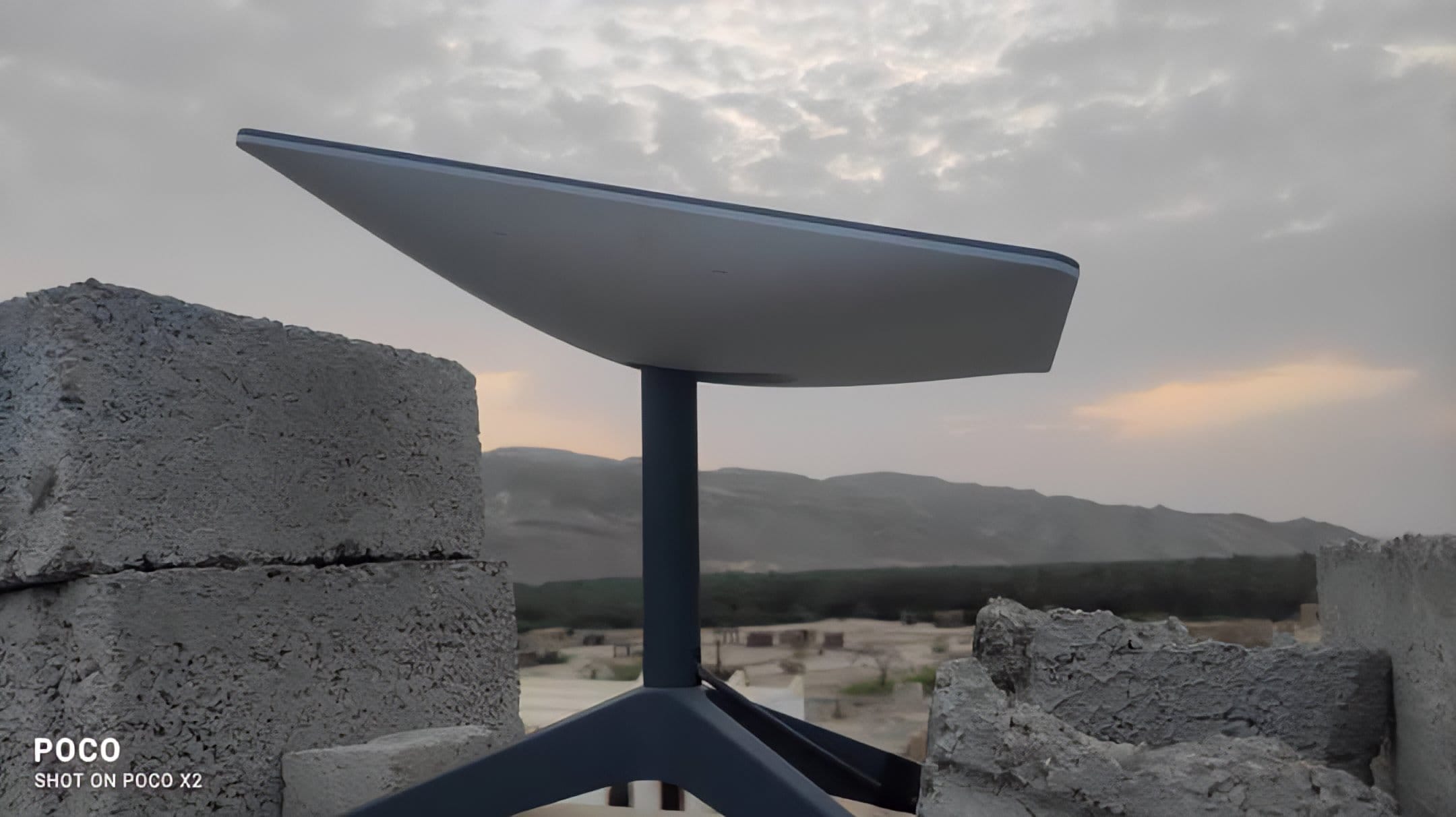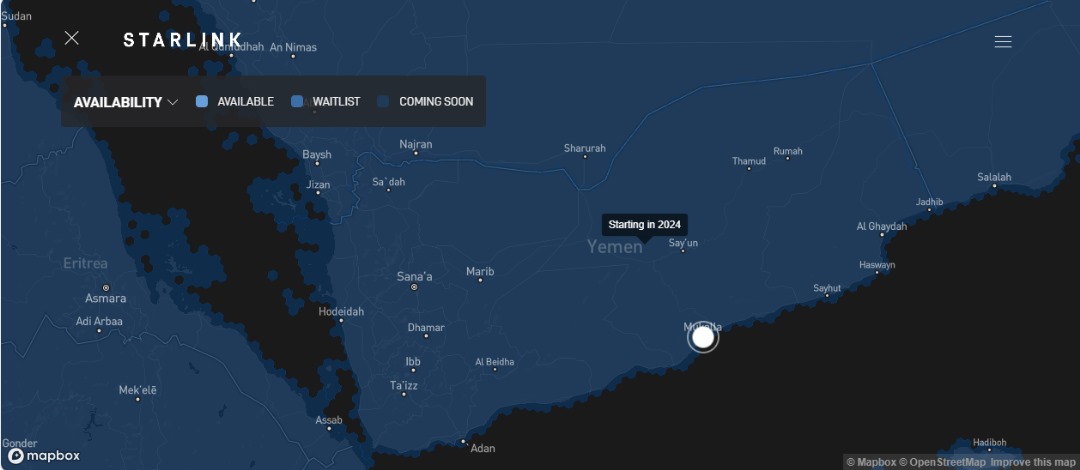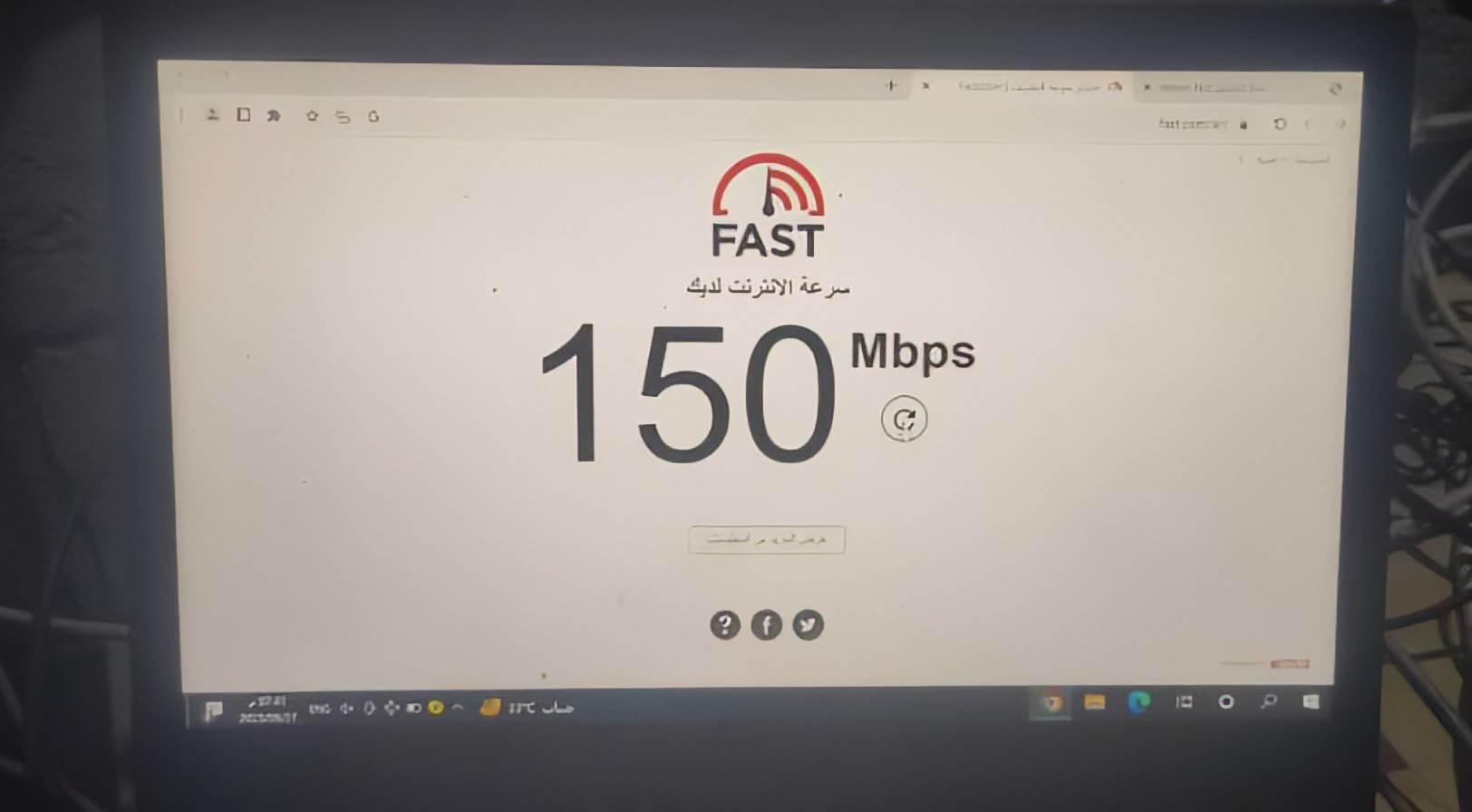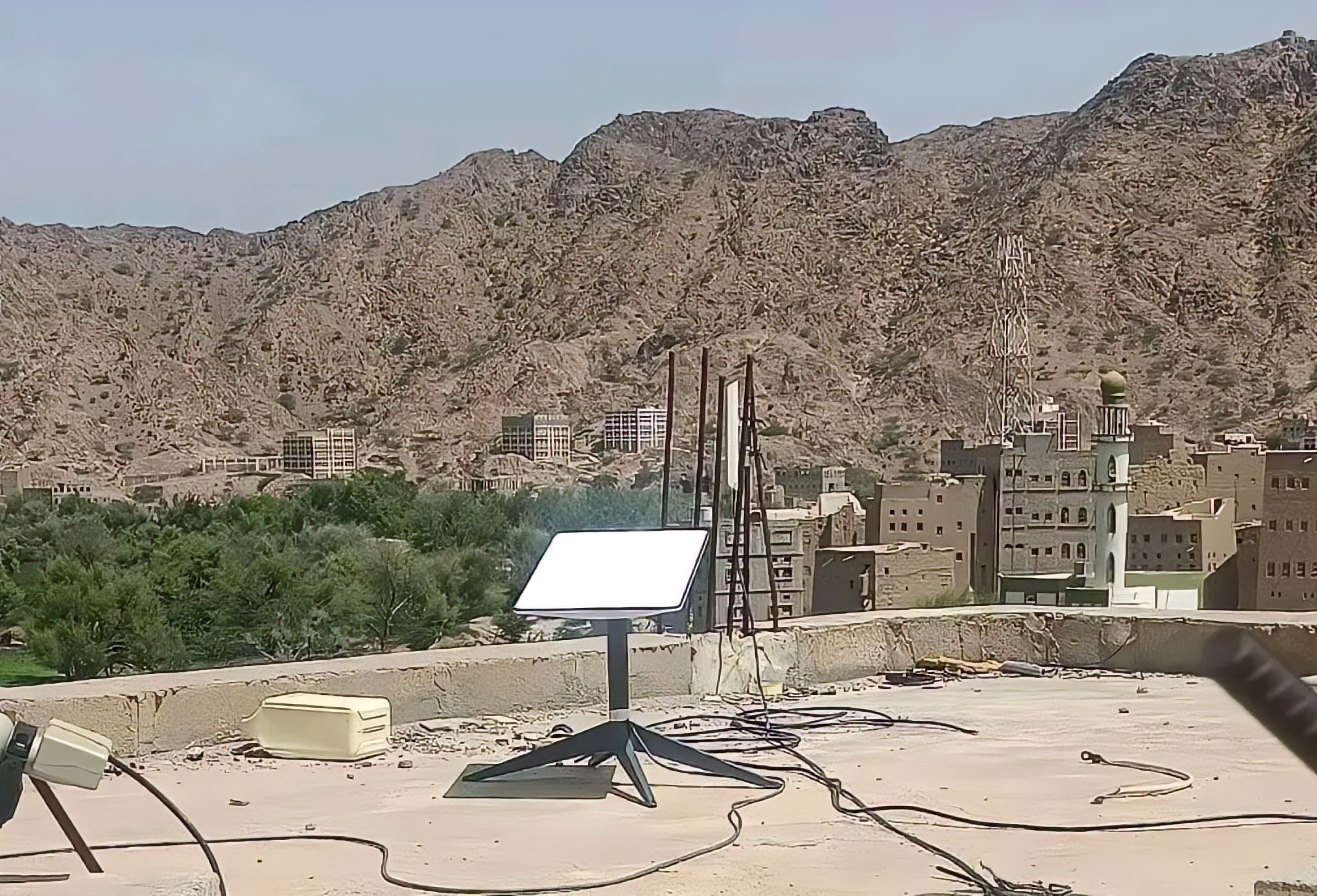
Starlink antenna, September 17, 2023, east of Mukalla (South24 Center)
Last updated on: 18-10-2023 at 2 PM Aden Time

’Starlink‘ is offering a revolutionary solution to the internet access problem in Yemen, and it can overcome the geographical barriers and limited infrastructure.
Abdullah Al-Shadli (South24)
The internet service in Yemen by the exclusive provider ’TeleYemen’ is among the slowest and most expensive globally. After the Houthis seized control of Sanaa in September 2014, the militia imposed many restrictions on internet users.
Yemen ranks 142nd in providing phone internet services, at a download speed of 7.31 Mbps and an upload speed of 6.46 Mbps.
As for fixed broadband services, Yemen ranks 176th at a download speed of 5.28 Mbps and an upload speed of 1.4 Mbps, according to the latest update of the website ‘Speed Test’.
The actual speed doesn’t really reach these rates for most users although it is very low compared to regional and international levels. Indeed, the download and upload speeds don't actually exceed 1 Mbps in most cases. Currently, attention has turned toward the satellite internet ’Starlink‘, provided by the company ’SpaceX‘, owned by the American billionaire Elon Musk.
Does it work in Yemen?
’Starlink‘ is offering a revolutionary solution to the internet access problem in Yemen and it can overcome the geographical barriers and limited infrastructure. Moreover, this technology provides users with high-speed internet from space regardless of their geographical location.
’Starlink‘ has not officially begun its operations in Yemen yet. Its website says that the service will enter Yemen by the next year - 2024. However, several people have been able to bring the satellite internet device in many governorates, including Aden, Sanaa, and Hadramout, according to some users who spoke to ’South 24 Center’.

The interface of the official website (coming soon)
Legally, this violates the state laws, according to an official in the Yemeni Ministry of Communications who spoke to ’South 24 Center‘. This forced two young men, Mansour Jomaa and Hassan Salem, to speak with us using pseudonyms about their experience in using the satellite internet after bringing in smuggled Starlink devices.
Mansour Jomaa told ’South24 Center’: “I have tried the service in Hadramout and Shabwa. It works well there. Al-Mukalla has about 30 Starlink devices. Most of their users aim at providing customers an alternative to ’YemenNet’.”
He recently began a wireless internet project (Wi-Fi) which offers unlimited internet in return for a monthly fee, which is a much better deal than ’YemenNet’ which provides limited packages that are not profitable enough for the owners of the Wi-Fi networks.
Hassan Salem, who uses the satellite internet in a remote area in Hadramout, said: “Starlink devices are easy to use, though difficult to obtain. Now I have a Wi-Fi network in my area. Previously, the internet I used had limited capacity and very high cost (400 Yemeni riyals per gigabyte).”
He added: “I used to pay up to three million Yemeni riyals monthly. Now I just pay 250 US dollars (360,000 Yemeni riyals) with an open capacity and a higher speed, especially in the beginning.”
The author of this report tested the internet speed to know whether the Starlink service works in Hadramout. We found that the internet speed in Hassan Salem’s device was up to 150 Mbps. The speed decreased to 16 Mbps after sharing it with Wi-Fi users. Such a speed is very high and unprecedented in Yemen.

Testing the internet speed in Hassan Salem’s device, September 17, 2023
Mansour Jomaa said that sometimes the speed even reaches the level of 250 Mbps.
Prices and quality
At the declared international level, the cost of the antenna and router needed to connect to the satellite in order to enjoy Starlink services in the United States is about $549 while the monthly subscription fee is about $99.
The economic and political conditions in Yemen hinder obtaining Starlink devices. Many people, like Mansour Jomaa and Hassan Salem, connect with smugglers and brokers to sneak in these devices from different European countries.
The two young men paid multiple times the supposed cost to obtain the devices. Jomaa said that he paid about $2,000 while Salem paid nearly $2,500 which is five times higher than the official price.
In addition, those who obtain the devices are being blackmailed by the brokers and smugglers, according to Hassan Salem. He said: “The broker takes $250 as a monthly fee although the actual fee varies between $99-170.”
Mansour Jomaa appears to be in a better situation as he pays the broker a monthly fee of $100.
He warned against dealing with people who aren’t trustworthy, adding that “it is important to have the email address to which the device account is linked if you don’t purchase it from the company’s official website. The device will be worthless without obtaining this data.”
Despite the high internet speed of this technology, it lacks consistency, which is the only flaw according to the two young men. According to them, the service gets affected after they resell it to users through their wireless networks. “Therefore, we have concerns about the sustainability of the service.”
Technical engineer Taher Bin Qafla told ’South24 Center‘ that, “according to these real experiences and the feedback received from some people in Hadramout, the financial costs are the only obstacle for individuals to use this technology. On the other hand, companies and rich people have no barriers to enjoy it.”

Starlink antenna device (courtesy Yemeni activists and engineers on social media platforms)
He added: “The companies already use the ‘YahClick’ service provided by TeleYemen via satellite at a cost not much different from Starlink’s. However, the quality is relatively poor and is not appropriate for companies. Therefore, this technology will be very suitable for them if available.”
Where do the devices come from?
So far, the selling operation of Starlink services is limited to the booking system for areas where the service has not yet been launched, according to the company’s website. Furthermore, the Ministry of Communication and Information Technology in Aden has not yet determined the mechanisms for individuals to obtain Starlink devices.
Nonetheless, obtaining these devices isn’t an impossible task for those who want to get them. According to Jomaa, he obtained the device from “a high-level figure” at the Rayyan International Airport, in Mukalla, capital of Hadramout.
He claimed that the devices come from the UAE, and via smugglers are brought to Socotra and then taken to the Rayyan International Airport in Hadramout. The biggest cause of worry for the smugglers is how to sneak the devices out of the UAE. On the other hand, bringing these devices into Yemen is a very simple task."
The official source from the Communication Ministry in Aden told ’South 24 Center‘ that “several sensitive governmental departments use this technology today. However, it hasn’t been licensed for public use. We will seize any detected devices related to this service.”
The fate of ’YemenNet’
For many years, ’TeleYemen‘, the exclusive Internet service provider in Yemen, which is currently under Houthi control, has raised much controversy among users. This is especially related to the high economic and security benefits that the Houthis get from this service's revenues and the general communications sector.
Related: Telecom Companies are the Houthis’ Economic and Security Lungs in South Yemen
Despite the attempts of the company to improve the service, especially during the current year, and to broadly introduce 4G technology, the service is still unsatisfactory. YemenNet’s users accuse the telecom company of monopolizing the service and blackmailing them to continue pumping the flow of revenue into the pockets of the militias.
In March 2022, the Communication Ministry affiliated with the Houthis warned against selling, importing, or using ’Starlink‘ devices or any other company that provides the same service.

The reservation page for Starlink devices, October 15, 2023 (official website)
In a statement, the ministry said that “People who indulge in these acts will be subjected to security prosecution along with seizing the devices since these companies don’t have the license to do so.” In Aden, the official capital city of the country, the state company ’AdenNet‘ has failed to provide internet to a wide segment of the population.
Recently, a joint Emirati-Yemeni communication project was announced. However, its implementation hasn’t yet begun.